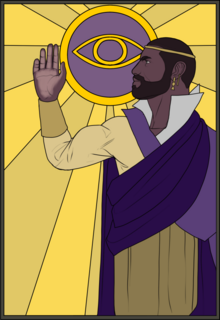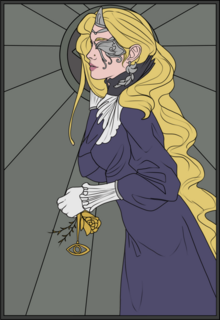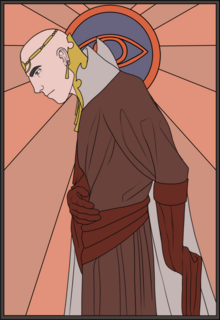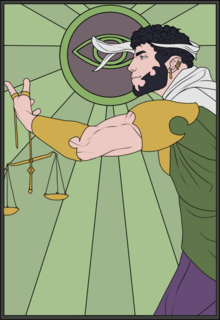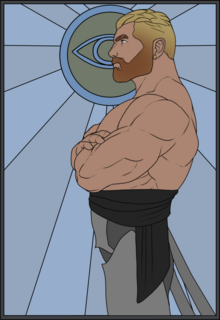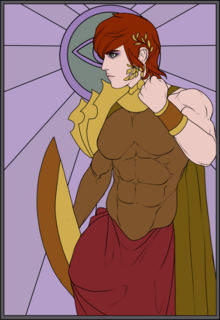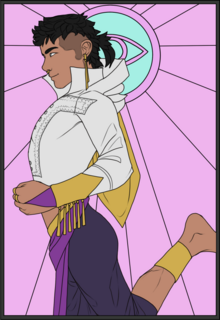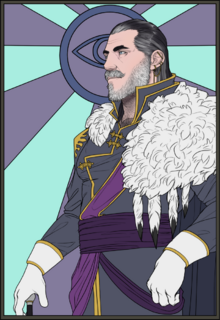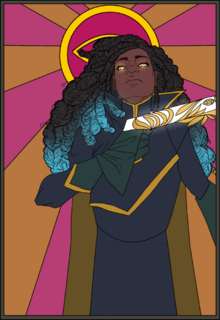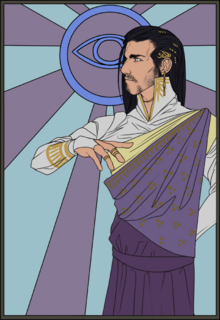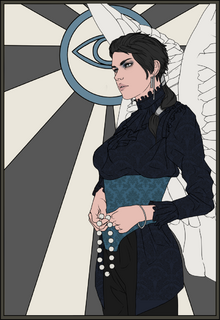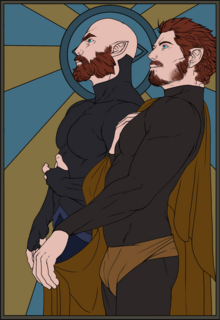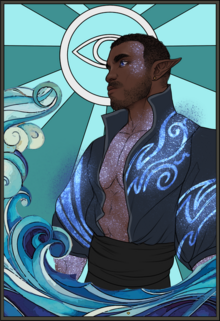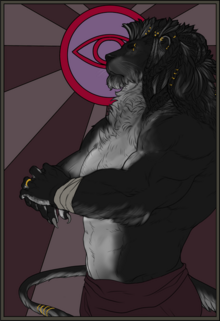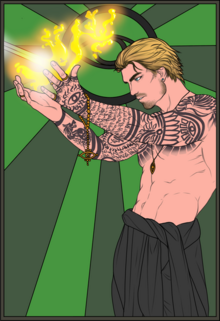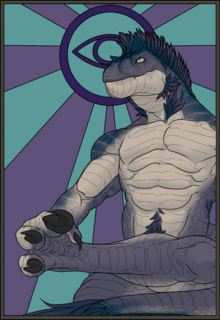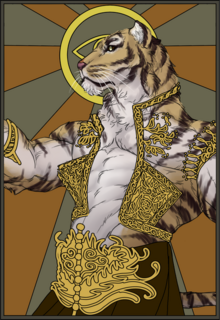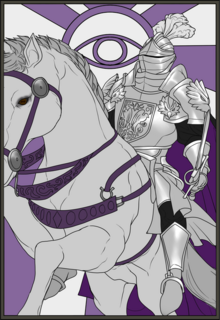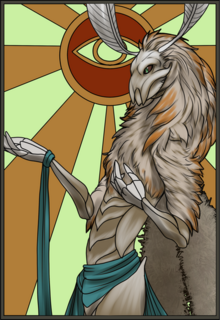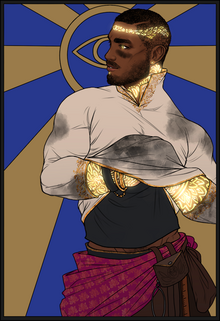| Unionism |
|---|
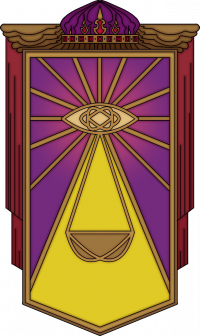 |
| Religion |
|---|
| Pronunciation |
Yoon-yen-is-m |
|---|
| Origins |
Emperor Theomar |
|---|
| Deities |
|---|
|
The Everwatcher and various other Gods and Goddesses |
| Subsects |
|---|
|
|
Origins
The origins of Unionism are well recorded as it is one of the youngest religions in the world. Unionism was originally founded as an Ailor-only religion by the prophet Emperor Theomar I Ivrae-Kade, of the Regalian Empire following its founding. The prophet spoke about a divine entity called the Everwatcher contacting him in a series of visions, before appearing to him in person, to speak to him about the fate of all living things under the stewardship of the Ailor Race. Emperor Theomar then wrote the holy chronicle called the Creed, which acts like holy scriptures, containing all the religious laws and concepts dear to Unionism. Following the prophet’s death, it was ordained that the Everwatcher would select Emperors of Regalia as its Vessel through which it would speak and guide destiny. Each successive Emperor has made small and large changes to Unionist doctrine by editing parts of the Creed, meaning this holy scripture ended up being a document that evolved as time passed. The Religion has gone through various phases referred to as "ascendancy", "revisionism", and "advancing". The first of which defined a period up to the Regalian Pessimism when all Races were welcome, but the faith was very strictly enforced. The Revisionist era ran concurrent with the pessimism up until the Ranger Crisis, when ultra nationalists attempted to revise the interpretation of Creed and civil governance to make Unionism more Ailor-ethnic-centric and push down on other religions even harder. The Advancing era starting roughly with the rule of Emperor Alexander I is hallmarked by a return to the racial inclusion of the Ascendancy era, while also loosening the repressive enforcement of the Revisionism era, creating even an interpretation of Unionism that was more palatable to non-believers to support. Unionism is fairly unique in comparison to other religions, in that it suffered several schisms, major events of theological conflict between its worshipers that resulted in the community splitting each time. As such, there are 3 distinct Unionist beliefs now: Dogmatic, Evintarian, and Guided. Each of these have their own structures, beliefs, and hierarchy, though all invariably worship the Everwatcher, and work towards a common goal, of Regalian hegemony and rule over all the world and its people and for the Emperor of Man to become the Emperor of All.
Schisms
Evintarian Schism
The Evintarian Schism occured directly after the death of the prophet Theomar, when the Concilly Council convened to discuss the matter of the succession. Several Concilly members had dabbled into Magic already, and more of them were of the opinion that Magic could be used to advance Humanity by using it. The hardliner Dogmatic Councillors however felt that Theomar’s preaching on the purity of the soul proved that Magic was a corruption that should be guarded against. The Schism occured when the hardliners broke off the Conclave and started hunting down Magic-users, turning the Empire distinctly anti-Occult. The Evintarian (named after their preacher Horopados Evinter), fled to Etosil and seceded from the Empire. They were later re-integrated into the Empire, but remain religiously separate. And have developed a more pro-Occult and evolution-oriented view of Unionism called Evintarian Unionism. There remains a lot of bad blood between the Evintarian and Dogmatic Unionists because of the religious violence between the two over the centuries.
Guided Schism
The Guided Schism has a somewhat more staggered appearance, in that it did not come about in just a single schism. However, Guided Unionism chiefly came through the unification of two notable splits from traditional doctrine, Dogartan Unionism and Vultragon Unionism. Dogartan Unionism was a very small schism of Anglian preachers who rejected the wealth of the Evintarian and Unionist Councils, espousing the virtues of asceticism and poverty. Vultragon Unionism on the other hand was triggered by commoner resentment against the aristocracy and the ruling classes abusing their power, embracing critical thinking as they questioned authority. In recent years, the Dogartan Celates developed new theological arguments heavily rejecting Ivrae-Sange legitimacy and establishing the Guided Divine Beings as their true version of Canon, claiming that the Ivrae dynasty was so incompetent that by their incompetence, they admitted to being usurpers of the true Vessels. This message was well-received by the Vultragons, leading to both communities to merge into the Guided Schism. Many other fringe groups were successfully absorbed by Guided Unionism during this time and afterward as well. Because of its inherently critical nature and belief that Alexander is not the correct Emperor, Guided Unionism is not well liked by the other religious schisms of Unionism.
Core Identity
Unionism is a Polytheistic religion with a single superior divine being, who is intangible and provides only spiritual guidance, while the Gods and Goddesses interact with the faithful and apply their divine will and power on the world. This intangible supreme being called the Everwatcher reincarnates in every Regalian Emperor (passing through females, but never permitting them to inherit) when they pass on to guide the mortals through the Emperor's words. Unionism has tenets, but as opposed to a clear set of vices and virtues, Unionism's Tenets are the Divine Lessons (which increase as new Gods are added over time). Unionism is unique when compared to other Religions as it did not start out with a Pantheon save for the Everwatcher, the supreme being, and Theomar the Prophet. It expands as time passes, as new Gods and Goddesses are discovered, or Gods from other conquered religions are added. This makes Unionism the only true Syncretic religion in the world, which generally promotes stability and cultural exchange in the Empire. Each God and Goddess represents a Divine Lesson, which is a guideline to live one's life by, but also a vice to avoid.
Beliefs
- Afterlife: Unionism has an Afterlife known as the Stairway of the Everwatcher, which is an endless staircase up to the (empty) throne of the Everwatcher which he will ascend to in Paradise. Unionist religion is unique in that it states that once the true virtuous and faithful Empire blessed by the Everwatcher commands all souls on the world (this is called the Great Way), that the Everwatcher will reward service by creating paradise, a world without disease, without suffering and without death. All those who were judged virtuous and entered the Stairway of the Everwatcher will come back to life, and join their descendants and loved ones in eternal bliss. Those that fail the judgement of virtue on the Stairway are instead reincarnated to have another chance at proving themselves for the Great Way.
- Canon Evil: Canon evil is somewhat dubious, and exists on multiple levels. The most obvious evil in Unionism is called the Sin of Creation. The Sin of Creation implies that all living beings were born with inherent flaws to overcome to prove their worthiness for the cause of the Great Way. As such, evil is done simply because people do not have self control or inhibitions. The next stage of evil are Spirits. Unionism acknowledges all entities coming from different dimensions save the (Alorian) afterlife as Spirits seeking to corrupt the minds and wills of the living. These beings infest or seduce the living into giving into their Sin of Creation. The third level of evil is somewhat more ambiguous, as it is other religions. While Unionism doesn’t strictly deny the existence or validity of other religions, it does claim that by worshiping anyone but the Everwatcher, that the living are led astray from creating Paradise, and that they live in sabotage of the Great Way’s conclusion. Essentially, other religions are seen as a distracting evil.
- Conversion: Unionism is a religion that has invariably been applied with the sword, or without word, and both interpretations are somewhat correct. Unionists believe that a person, even one who is not Unionist or pretends to be Unionist, can still work towards the Great Way if pointed in the right direction by the faithful. This is why the Confessions of Melennar are important, because this preacher created a common understanding that as a Regalian Unionist ruler, one’s non-Unionist subjects can still work towards the Empire’s cause, while not believing in the Everwatcher, and their soul can still ascend to the Unionist afterlife if their own religion or a-religiosity will not claim them. As such, conversion by the sword is also fully acceptable, because it forcibly induces someone into the Great Way, though it has become more controversial and less acceptable as of late.
Gods and Goddesses
Unionism is currently undergoing the Divine Merger, involving the Schisms coming back to the mother Unionist religious community. This process will be slow, so updated Gods will be added to this list as time passes, with the old forms still shown below.
Prophet Gods Theomar and Thedmir
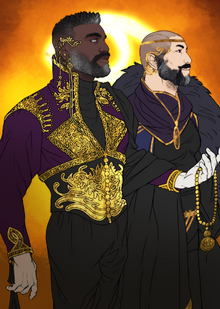
- Name: Theomar (left) and Thedmir (right), the Prophet Gods, first believers.
- Patron: Fathers, Rulers, Nobles, Leaders, Commanders, and Best Friends.
- Symbols: Theomar and Thedmir are symbolized by the necklace of friendship.
- Role: Theomar and Thedmir were the Prophets of Unionism, spreading the faith.
- Traits: Patriarchy, Insight, Good Governance, Loyalty, Friendship, Faith.
- Temple: The All-Beacon Temple in Regalia proper, the largest Unionist Temple.
- Allies: Regulus Worshipers, Dáuw Worshipers, anyone in the military.
- Enemies: In essence all Evolist worshipers, and all Vola Fornoss Gods.
- Rituals: Theomar and Thedmir Rituals involve re-enacting the struggles of them in the early days of Unionism. This involves preaching the faith to non believers, aiding the faithful in the defense of their holy shrines and places of worship, to mediate and act as diplomat for embattled groups, and to provide spiritual guidance to the Military. Theomar and Thedmir also have rituals concerning the sanctification and re-affirmation of friendship.
|
|
Mother Gods Ness and Eora
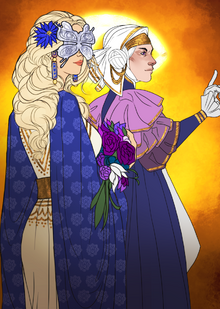
- Name: Ness (left) and Eora (right), Empress and Chancellor in life.
- Patron: Mothers, Healers, Caretakers, Protectors, Empaths, Martyrs.
- Symbols: Ness's Butterfly Mask, and the Habit (head scarf) of Eora.
- Role: Ness and Eora are the savior Goddesses of Unionism who care for believers.
- Traits: Protective, Motherly, Nurturing, Caring, Self-Sacrificing, Forgiving.
- Temple: The Temple of Salvation in Old-Town forest side, which doubles as Hospital.
- Allies: Leif Worshipers, Severena Worshipers, Daiana Worshipers, Medics of any Faith.
- Enemies: Murderers, people who adopt adults, people who attack medics/the unarmed.
- Rituals: Ness and Eora rituals are all about forgiveness and nurturing and healing others. This may involve taking confessions, but can also involve volunteering at a medical station or healing house. Furthermore, Ness and Eora faithful travel prisons and downtrodden areas to give forgiveness to the damned, and offer them love and kindness where there is only the cold sting of rejection and apathy to the fates of the forgotten.
|
|
=OLD LORE BELOW HERE===
Theomar, God of the Beginning
|
|
Theomar is the Vessel God Prophet, the first of all the Gods and Goddesses under the Everwatcher, and the first author of the Creed, the holy book of Unionism which records the correct interpretation of the faith and all the Gods. The Creed is a living document, meaning that successive Emperors have made sweeping changes (some even controversial, like the nature of Magic), however generally speaking the core ideas of Unionism remain always the same since they were written by Theomar. Theomar is sometimes also called the God of fathers, as he is the patron of good fathers and Kings and Emperors, as well as the clergy. Theomar's Lesson of life being a struggle is applied through the many hurdles he had to face as first Emperor of the Regalian Empire, in converting a mostly Old Gods and Dragon Worship faithful population and stomp Unionism out of the ground from nowhere after he received his visions. The Divine Spirit of Theomar rarely manifests unless for very important pivotal events for Unionism. Theomar's largest Temple is the All-Beacon Temple in Regalia, the tallest white spire of the city where he is buried in the Dais of Faith underground.
|
|
Ness, Goddess of Forgiving
|
|
Ness is the Called Goddess of Mercy. She is always depicted in her mourning dress and butterfly mask. She was the wife of Emperor Henri I as Nessaria van Sherburne, living a life of pleasure and adultery, until she had her eyes removed and gave birth to her three children who would all become Emperor and be assassinated one after the other, Bartolomeux I, Carvallais I, and Maxelle I. Nessaria ascended to godhood in the act of mercy as the accused assassins fell to their knees, weeping, and clutching her dress for forgiveness. Since them she visited the prison every night until her death, and as if by magic turning the worst and most violent of sinning criminals into repentant faithful. Ness's ascension was verified by the Concilly Council after as her Divine Spirit kept manifesting to save the lives of those who needed mercy, to stay the hand on the executioner's blade, and to bring conscience in those who were thought to have none. Ness is the patron of mothers and judges, as well as criminals seeking redemption. Her largest Temple is the Temple of Salvation, which was destroyed during an attack of Ordial entities in recent years, though her coffin in the Chamber of Mercy survived.
|
|
Juvin, God of Wisdom
|
|
Juvin is the Vessel God of Intellect. Juvin was the 11th Emperor of Regalia, Henri III. Juvin is remembered as being a person of towering intellect and insight, and living a pious and ascetic life in serene virtue. Juvin had one of the most intellectually stimulating courts with philosophers and intellectuals from far and wide coming to converse with the Emperor as if he was a common man seeking to learn. The Concilly Council verified his ascension after death, as his wise Divine Spirit descended to those seeking divine inspiration on their essays and proclamations, as well as those finding themselves cornered by writing blocks. Juvin is the patron god of writers, thinkers, but above all scholars. Though, he also shortly was the reason for a micro-schism, in that the Juvinite Cult eventually became the Dogartan Unionist Schism, which was the same as Dogmatic Unionism but demanded a more ascetic lifestyle of the Nobles and Priests, and would eventually merge with Guided Unionism. Juvin's largest Temple is the Temple of Greater Understanding in Regalia, where he is buried.
|
|
Almar, God of Justice
|
|
Almar is the Vessel God also nicknamed the Allmaverick, who was the 13th Emperor of the Regalian Empire Allamaria I. As a young Prince, Almar was a wild spirit who enjoyed the soft and hard power royalty gave him, with many wild conquests and broken hearts. He was crude and callous to foreign dignitaries and priests alike. It was said however that he received a series of visions which the Concilly Council later verified came from the Everwatcher that granted him Divine power, making him a rare case of a Vessel God having Divine Powers while they were still alive. While he was blindfolded, any justice case he resided over he could perfectly recall all facts and saw through any lies that were told to render fully unbiased and justly applied punishments. After death, he was once more verified as a Vessel God when his Divine Spirit presided over important trials. Almar's greatest Temple is the Temple of Eternal Justice, which was converted to the Imperial Courthouse, where he is buried underground in the Faith Chamber of Judgement. This is the only Temple that is not actually a Temple but a different building.
|
|
Allest, God of Strength
|
|
Allest is the Vessel God also nicknamed the Bearclaw because he was exceptionally large even for an Ailor in life. Allest was born Allestrain I, being the 15th Emperor of the Regalian Empire. He and his best friend Arch-Chancellor Alexander the Giant presided over the Empire's fastest and greatest growth, conquering many lands. Allest was undefeated, even in his teenage years easily defeating Imperial Guards who were much larger than him, and later taking on hundreds of foes as the first front-line Emperor. The Concilly Council verified his Divine power of indestructibility as granted by the Everwatcher, making him another rare case of a Vessel God with Divine Powers while still alive. Allest was eventually killed in Nordskag shortly before the end of the war by an arrow through the heart while on the battlefield. How he could have died has been a topic of heated debate for a long time, though it is generally held that he was killed by one of the Old Gods or some other unknown God, as only Gods can kill other Gods. Allest is the patron god of those wishing to become strong warriors or generally become stronger versions of themselves. His largest Temple is the Temple of Perpetual Glory in Vultaro, though his coffin lies empty as his body was never recovered, only his Artifact blade Sangria which is now in possession in Regalia.
|
|
Elia, Goddess of War
|
|
Elia is the Called Goddess also nicknamed the Brass-Fist as she fought with combat punching gloves and her favorite shield. Elia was Emperor Allestrain I's wife, making her the wife of God Allest also, though she was not verified by the Concilly Council until after death when her Divine Spirit would appear on pivotal battles for the Regalian Empire, like the siege of Fessa Huallo to deliver important combat performance to aid the Empire. She fought in the frontline of war, just like Allest and his friend Alexander did, she did with her best friend Leona, who was Alexander's wife. Elia is the patron goddess of generals and soldiers, those wishing to come out alive in war, and those wishing for victory. A curiousness about Elia's shrines, is that there is an unwritten law among Unionists that to steal documents from an Elia shrine incurs her wrath, making them common places to hide legal documents. Her largest Temple is the Temple of Unyielding Perseverance (sometimes also called the Temple of Punching Harder) where she is interred next to an empty coffin supposedly meant for Allest.
|
|
Vess, God of Freedom
|
|
Vess is the Vessel God also nicknamed Vilgy, who was the 26th Emperor of the Regalian Emperor Vilgemar I. As a mortal they were remembered as good natured and good willed, until one day they claimed to have received divine premonitions of the Empire's fall to corruption and tyranny, and to receive Divine insight in all the corners that evil was hiding in the Imperial Administration. They both eliminated the Morgannt then, and began a crusade against the tyrannical nobles and rulers of the Empire, eliminating scores of them but to some degree also failing to tackle the Van Sherburne Family due to its prior royal connections, and setting the stage for the Baron Rebellions. The Concilly Council verified their Godhood after their death when their Divine Spirit manifested to direct Imperial Inquestors and Inquisitors alike to the deepest recesses of the bureaucracy and the peerage, finding those that were corrupt, and revealing evidence for their trials. Vess is also fondly remembered as the patron of entertainers and freedom fighters, their plight was less to do with justice and more with freedom from tyranny. Their largest Temple is the Temple of Joyous Everwatch, where their coffin is surrounded by an ever growing pile of broken chains, one for each freed slave in the Empire.
|
|
Alexander, God of the Vessel
|
|
Alexander is the living Vessel God of the Everwatcher, though this role is somewhat unique. Where-as all other Gods and Goddesses are permanent, Alexander as the living Vessel of the Everwatcher is a temporary God. Every living Emperor who is the Vessel of the Everwatcher is temporarily a God until such a time that the Concilly Council is able to verify them as having Godhood on their own, or to consign them to the history books as a mortal Emperor. Alexander has yet shown no Divine Powers, and is generally even seen as a somewhat ineffective Emperor due to his insistence on ruling by consent and compromise. Nontheless, he is seen as a patron of diplomats and those using their charisma to get their ways, as he is a great mentor and example to those who seek to include others in whatever problem they are trying to solve. When Alexander dies, the next Emperor is expected to take his place as the God of the Vessel. The Palace doubles both as his residence, as well as his Temple.
|
|
Taal, Goddess of Purity
|
|
Taal is a living Called Goddess, originally born a mortal but recently uplifted into her current status by the Concilly Council. Taal is the patron of the Belliards, those who hate Magic and all forms of Occult no matter how benign, as she also seeks to root out the Occult infestations in the Empire. In Taal's preaching, the Occult is always a stain on the soul of mortals, even Dragon Occult, as a rot that brings about all the vices that the other Gods and Goddesses warned about. She has personally provided the purists with Pure stone and Hallowed stone, enabling the invention of Puretek and other wondrous anti-Occult devices held by the Lothar Knights and Belliard organizations. Taal still roams the land, executing renegade Occult who draw too much attention to themselves while healing and cleansing any area corrupted by uncontrollable Magic. Taal's largest Temple stands in Praag in Osteiermark, called the Temple of the Pure Vigil, where she herself occasionally preaches to the faithful.
|
|
Nicholas, God of Stewardship
|
|
Nicholas is the Called God Architect, a man so incomprehensibly skilled and competent, that the Concilly Council verified him after death as having been undoubtedly Divine, even if the scope of his power could not be understood until after his death after having reigned for 86 years as Arch Chancellor under several Emperors. Under his reign, the Empire expanded, the economy soared, and Unionism spread like wildfire. He was the Architect of the Empire's greatest moments that endured after his death, cementing his place as a Divine Spirit, even if his manifestation has not been seen since his death. Nicholas is the patron of stewards, scribes, tacticians, planners and leaders, prayed to for insight and skill in leadership. His largest Temple is the Temple of the Trodden Fields in Axenfoort, the capital of Anglia, one of the rare cases of a Grand Temple being built outside of Regalia (and unfortunately shared with the Guided Unionist Schism).
|
|
Elen, Goddess of Burden
|
|
Elen is the Joined Goddess of the Breizh people, originally part of the Weard faith but incorporated into Unionism after the Breizh people formally joined the Empire under Theomar, making her also the oldest living Joined Divine. Elen stands in direct opposition of Taal, as the Goddess who represents the gift of Magic, claiming that (not magic itself but the ability to have Magic) is a divine gift of the Everwatcher who enables a soul to be born, or to comprehend in learning. Equally however, she hammers home the point that any soul that draws extra attention to the Everwatcher to this degree, must also have a higher purpose than any john doe, and should live up to this purpose and live a life of virtue and refrain from vice. Elen's pro Magic stance was surpressed for a long time under anti-Magic Emperors, until the Aelrrigan Order was restored, along with her pro-Magic religious interpretations in the Creed. Elen's largest Temple is the Harel Moher Temple in Coltyr outside of Regalia, which is entirely built underground and where she closely co-operates with the Aelrrigan Order to protect Magic.
|
|
Niall and Nolan, Twin-Gods of Art
|
|
Niall and Nolan are the Joined Gods of Culture and Military, originally part of a sub-sect of Ceardian Pagan beliefs related to but not identical to Old Gods (though some parallels have been made with Old God Njal). Niall and Nolan are unique in that they were verified by the Concilly Council not as two seperate Gods, but a twin-God pair with complementary elements. Niall (hair) represents the need for art to moderate the roughness of the military, while Nolan (bald) represents the need for military to moderate the softness of art, thus creating balance. Niall and Nolan both made paintings with future premonitions in them to interpret by the faithful, as well as some of the Empire's most prized art collections now houses in the Imperial Palace. Niall and Nolan were alive in the first century of the Empire's growth, but have showed up less and less since that time, though remain confirmed as Gods. Their largest Temple is the Gallery of Divine Will in Loiree-Bas, Vixhall, where many of their paintings remain that perfect wed the gruesome nature of war, and the delicate skill of art.
|
|
Ceren, God of the Seas
|
|
Ceren is the Joined God of Nature, though more specifically of the sea as a reminder of the terrible power of nature and less of the dainty and frivolous flowers and butterflies. Ceren belonged to a very small Fin'ullen faith that diverged from Estelley after the collapse of the Allorn Empire, bringing them along in the migration waves of Fin'ullen to Regalia, where the Concilly Council verified their blessings for the Regalian Navy out at seas, giving favorable winds and protecting them from sea monsters. Ceren represents the spectacular destructive capacity of nature, and many sailors and explorers say prayers to him for good winds and safe journeys. Ceren is still alive and frequently appears to give ships at risk of being beached or destroyed in rough storms safe and clear waters, saving the sailors from a terrible drowning or being eaten by some monster. Ceren was instrumental in saving many of the Regalian ships during the Bone Horror crisis that struck globally, and kept most of the Empire's trade network alive until the military could clear the oceans of Bone Horrors. His largest Temple is the Mellow Water Pond in the north of Solleria where the largest Fin'ullen populations live.
|
|
Hor, God of Service
|
|
Hor is the Called God of Service, known as Horremenet as a mortal. Hor was thought as just a regular exceptionally large Asha, but was investigated by the Concilly Council as he was repeatedly able to take fatal hits while protecting his clients as bodyguard without dying, and on some occasions even wished them back to life. Hor was eventually verified as a living Called God, blessed by the Everwatcher with God-like powers of resurrection and protection of others. Hor is the patron god of bodyguards, but also Metropolitan Constables who are Unionists, or Noble House Guards, anyone wishing to protect anyone else. Hor does not yet have a Temple dedicated to him, however Unionist Asha are building one in the region of Mandu in the south of the Regalian Archipelago called the Divine Claw Rending Temple. Hor is somewhat difficult to approach, as even though he lives in Regalia, he finds it hard to leave the house without a horde of faithful approaching him, and he is a person of few words, resulting in the Metro cordoning off the street he lives in to give him privacy. He appears occasionally on battlefields, claiming to have received a vision to save someone from certain death, which he always ends up doing before leaving again.
|
|
Kristopher, God of Sacrifice
|
|
Kristopher is the Called God of Sacrifice, and the youngest God to be added to the pantheon just this year. Kristopher was a commoner street urchin born in Calemberg, who lived most of his life a repressed Mage, eventually falling in with the criminal circuit in Calemberg but making a name for himself as a conscientious and pious criminal who gave half his winnings to the homeless. Kristopher was killed as just another faceless victim to Magical terrorism in Regalia when he visited a cafe that was blown up to target the purists inside that he had no relation to. After his death, the Concilly Council investigated reports of his Divine Spirit appearing in Calemberg, leading the 14 powerful families in religious communion to achieve a better understanding of Magic and how to restrain it. His views lie somewhere in between Taal and Elen, in that Mages should be induced into forced guilds for training and conditioning, and that a free and independent Mage is always a risk. Surprisingly, Kristopher is also the patron of craftsmen, as even though he was a matter Mage able to make things from thin air, he always spent large amounts of coin on craftsmen so that his magic would never unintentionally put mundane crafters out of business, to make sure his Magic would never cause others suffering. There is no Temple dedicated to him yet.
|
|
Agus, God of Purpose
|
|
Agus is the Joined God of a large population of Allar who fled the Essa Empire long before the Chrysant War, guided by Agus a divine entity that sought out a better future for his followers. After nearly a century of drifting across the world on a massive fleet, harassed by Asha and Songaskian pirates and monsters alike, Agus claimed to have communed with the Everwatcher that his purpose lie with the Regalians, and so the fleet arrived and requested citizenship, which was granted after the Concilly Council verified his visions. Agus quickly became a representative of the aimlessness that so many faithful feel when they cannot see their purpose or fate for the Great Way. He is there to answer the anxieties about not knowing what is expected of one's self, and the wanderlust to see more of the world to create a greater understanding of the individual role in it all. He is still held in high regard even among Allar who follow the Great Alchzech, because he bestows particular favor towards the Allar in Regalia, but also grants divine insight to Allar not necessarily faithful of Unionism. His largest Temple is the Golden Rock in Hadar, being the only Unionist Grand Temple outside of the Regalian Archipelago.
|
|
Mendes, God of Prosperity
|
|
Mendes is the Joined God of Wealth, who was verified by the Concilly Council when large migrations of ex-Asha slaves from Daendroc arrived in Regalia along with Mendes with them. Mendes's Faith of the Golden Mask was a religion entirely founded during the Allorn Empire slavery days, before the Asha there could re-learn the Faces of Baskarr, and as such, it survived eventually being brought to Regalia. Mendes brought god-like powers of wealth with him, as well as the ability to turn the lands in which the Asha settled into fertile regions capable of sustaining crops where prior there was only silted rock. Mendes as a living Joined God is a bit unique, because his existence is both a blessing to the Empire's wealth, but also a curse of greed, as he is the only God to actively hold court, and accept direct offerings of gold and jewels from the faithful. This makes him exceptionally easy to approach, but also draw some controversy about the purchases of indulgences and his personal blessings to wealthy patrons. Mendes lives in the Temple of the Golden Mask in Regalia, and is seen as the patron of merchants and anyone else who wants to make a lot of money or strike out on a new enterprise.
|
|
Ilarion, God of the Covenant
|
|
Ilarion is the Called God of Knighthood, a very early God to be added to the Pantheon as the Concilly Council verified his god-like combat prowess, but above all his ability to draw supporters from far and wide and inspire great courage, discipline, and camaraderie in them. While never fully proved, it is said that Ilarion was instrumental in helping the early Knight charters with their codes, and binding the first generation loyally to discipline and hierarchy, so that the Knights would all succeed in their purpose. Ilarion has since acted as the supreme independent mediator between all Knight Orders, always wearing white so as not to show preference, and riding on his white steed. Ilarion is also the punisher of supreme betrayal, those who would sell out their Knightly Order or their fellow brothers and sisters in arms to the enemy. Ilarion's Temple is the Grand Temple of Fervent Service, where many Knighthood charters have sacraments of service dedicated to, passing their final exam by standing a 24 hour vigil on the steps of this Temple where Ilarion sits motionless on a simple and humble marble throne, without sleep or food, waiting for the next time the Everwatcher calls him to defend the Honor and Knighthood of the Empire.
|
|
Efrat, Goddess of Sanctuary
|
|
Formally called Queen Efrat bat Batsheba mimishpachat haGilead, Efrat is the Joined Goddess of Sanctuary and protection of the Home, Temples, and the Imperial Palace. Efrat as a divine entity pre-dates Unionism as a whole, having been alive for 433 years, and ruling the Narim Race for most of that time, also having played a role during the Five Family Rebellion to help the Regalian Empire's founding. Efrat is not worshiped by many, because her role in the pantheon is fairly small, but she bears a much more important role for the Narim as the Mother of the Night Court, a type of highest and most exalted priestess of Narim Unionism. She is confirmed in all other Unionist Schisms as a Goddess for the immense protection and powers she bestows upon the Imperial Family and the Imperial Palace. She is prayed to for protection of Homes from invaders, and protection for Temples against violence and blood spilling. Efrat does not have a formal Temple because she is alive, and administers the Chant of Hashem (the Everwatcher) from the Imperial Palace at midnight, meaning that her very presence is the Temple itself.
|
|
Al-Asir, God of Invention
|
|
Al-Asir is not actually the name of this God, his real name is Nadir Al-Taqdeer, though Al-Asir is the title the Qadir Ailor have given him, and is easier to pronounce for non-Qadiriq. Al-Asir as a divine entity pre-dates Unionism as a whole, having been alive since just before the Great Storm that ended the Sariyd Empire, which itself happened a century before the founding of Unionism. Al-Asir is the Joined God of progress, technology, invention, but also of never giving up, battling through any adversity, even if the odds are stacked against one's self. Al-Asir declined a religious-civil leadership of the Qadir, instead advising the Qadir to adopt a Meraic-style Technocracy, favoring his time spent on making quirky and wacky inventions, and theorizing with other scholars. Al-Asir is divinely blessed with immortality and divine sparks of creativity, but is also very down to earth and very accessible to mortals, as he works in Al-Alus's largest school of technology, and frequently entertains even non-Qadir visitors for lectures or help with malfunctional inventions. Al-Asir's greatest Temple is the Telocator Temple in Al-Alus, where Al-Asir is presently attempting to invent a technology-based alternative to Elemental Magic Portals. Al-Asir is prayed to for divine inspiration, to solve seemingly unsolvable riddles, or to overcome insurmountable odds of adversity. For more information on Al-Asir, consult the Qadir Page, as he is their Patron-God.
|
|
|
Priestly Activities
Dogmatic Unionist priests are part of the so-called Dogmatic Religious Community. At the very top is the Concilly Council. Originally this organization had a leader called the Supreme Reverend, however the Supreme Reverend position was abolished when the last Supreme Reverend discovered insidious corruption within the religious community, tried to expose it, and was assassinated for it. To compensate, Conclave determined that the Dogmatic community should henceforth be ruled by a Council of elder Arch-Celates. Below the Concilly Council, are the Arch-Celates, which are equivalents to Dukes in the Regalian Empire. They wield considerable power and rule over vast areas of land, subdivided into Celeries. Below the Arch-Celate is the Celate, or just the average priest. Each Celate administrates a Celerie, which is usually a piece of land donated to the clergy where they maintain temples, shrines, and convents, while also producing crops and tending to cattle. Celates perform all religious tasks such as confession, preaching, hearing concerns, and simply taking care of Unionist needs like a social caretaker or mental health worker. Arch-Celates on the other hand are more administrative in that they take care of the treasury, any military attached to the religious orders, and communication between the Concilly Council and the vast wide-spread Unionist elements. Formally the Emperor is the leader of the Holy Seat, which is more of a group term for the Palace and the Concilly Council grouped together, but historically Emperors have interfered very little in the day to day running of the Celeries, and as such, this fact is usually ignored, the Emperor being considered a completely independent entity. This has also historically separated the Emperor from controversy among the Celates, and vice versa.
The Nuance of Godly Tribalism
For those who have lasted long enough to read to this point, it should have become obvious that not all Gods and Goddesses see eye to eye, and that some of them even directly contradict each other. While the Creed theoretically exists to apply the correct interpretation and lessons to be learned from the Gods and Goddesses, reality often finds for example Elen and Taal followers at odds, and Elia and Niall & Nolan followers at odds because of ideological differences. Unionism does not demand the universal worship of every God and Goddess, often the faithful only pick a few that really apply to them, after all, why would an Anglian peasant worship the God of King and Emperors if only in passing to praise his name for the Creed and Prophecy. No God or Goddess is also more or less correct than another, in the eyes of the Everwatcher, each God has some degree of validity, and some degree of error which is prone in the Sin of Creation, both in the fact that even Gods and Goddesses can sometimes act in error, but also in that mortals can apply the wrong interpretation of their lessons to reality around them. It is important never to call another Character a heretic for preferring one God or Goddess over the other and disregarding the preaching of one to uphold those of another.
Trivia
- Unionism used to be mandatory for nobility somewhere during the second century after Cataclysm, though this Holy Law was removed when the war against the Skagger Horde ceased, and the Empire benefited more from including non-Unionists into the peerage. An exception had always been made for the Altalar nobles of Solvaan origins in Solleria however, called the Confessions of Melennar.
- Sectarian violence largely came to an end at the turn into the fourth century as the last attacks on Vultragon Unionist by state forces ceased, and an uneasy truce was signed between the Schism religious communities. They still do not see eye-to-eye, and the different Schismatic groups still prod at each other, but instead of murdering each other over sectarian differences, they mostly fight with words nowadays, a legacy of the Kleine Rechnung, the document that called for the truce.
- Despite Elen's absorption into Unionism, the Breizh still maintained a high level of cultural autonomy, some even clinging to old beliefs. As such, even when Magic became illegal in the Empire, the Breizh Aelrrigan Order continued to find and train Mages safely in their sanctuaries while the rest of the Empire turned to brutal oppression (and the Magic part of Elen was suppressed from dogma). Elen's faithful among the Aelrrigan Order are commonly cited as the reason why Magic acceptance eventually returned, and Elen's magical nature in theological teachings was returned.
| Accreditation |
|---|
| Writers |
MonMarty, FireFan96 |
|---|
| Processors |
Hemingway7 |
|---|
|
| Last Editor |
MonMarty on 10/14/2023. |
|---|
|
|---|
» Read more



